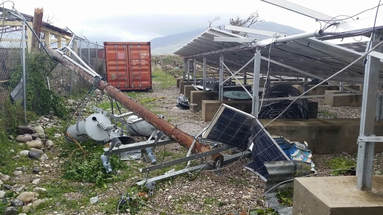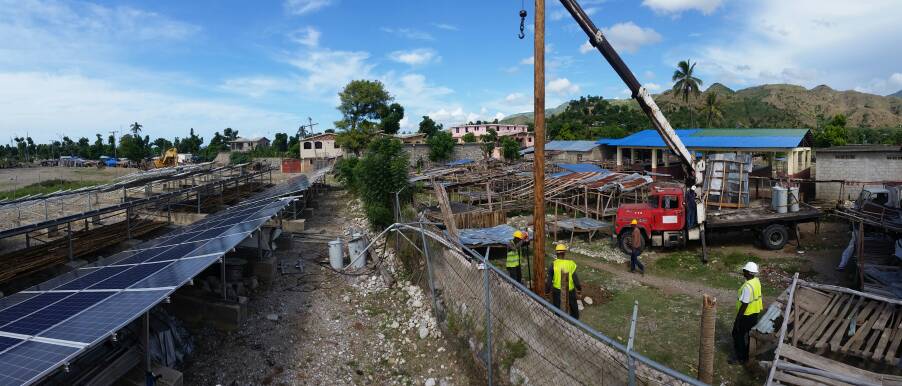 Hurricane Matthew significantly damaged the Les Anglais grid, but significant solar remained intact. Hurricane Matthew significantly damaged the Les Anglais grid, but significant solar remained intact. One year ago today, the storm surge from Hurricane Matthew began to pound the shores of Les Anglais, Haiti. Through the night, Matthew would pummel the town – shooting trees, buildings, and debris left to right, then, after an eerily quiet respite as the eye passed, relaunching debris from right to left as the bottom of the storm slowly moved north. Les Anglais was devastated. Smaller towns and places higher in the mountains even more so. The road had been washed away. Buildings and crops were gone. Almost everyone had lost their homes. Before the storm, Les Anglais had served as a testing ground for EarthSpark’s novel, nearly 100% solar-powered electricity grid. After the storm hit, electricity was not the priority in Les Anglais; shelter, water purification tabs, food, and health care were all more pressing needs. The electric grid that had served the town had suffered downed power lines and lost about 40% of the solar panels to wind and falling structures. Even had we had the funding to immediately repair the distribution system, repairs would have initially been impossible because, sadly, most clients had lost their homes and businesses and needed to rebuild before electricity could be safely restored. There's a difference between disaster response and resiliency planning. In our experience, immediately after Matthew, stand-alone solar lanterns and solar home systems were still working, easily deployable, and helpful for the basic needs of lighting and phone charging. The town grid’s solar array was damaged, but it was relatively straightforward to get about half of the array back online. Even without the poles-and-wires distribution system, the solar plus battery storage was able to serve community needs and businesses with higher levels of power directly from the generation site. We are just now starting the process of repairing the distribution system. This year, the EarthSpark team is watching with heavy hearts as other places get pummeled. We've been spared so far this hurricane season, but our hearts are with those who have been hit by the recent storms. It's awful to see all of the destruction and to know these scenes are going to become more and more common throughout the Caribbean, so it's a good time to work toward real resilience for all of these communities in the face of these climate disasters. One island over from Haiti, Puerto Rico's power grid is not likely to be restored for many weeks or months. El Puente, a local organization with climate organizing roots is working to get small-scale distributed solar supplies to the families of PR. They’ve established a solar fund and could use your help. This week in Les Anglais, the EarthSpark team is working with a local Haitian company to take the first step toward rehabilitating our grid’s distribution system, and we plan to have full service re-established soon. Even in our little grid, reconstruction has taken time, but the lesson for us is the more distributed the solar + batteries, the more resilient the system. Haiti has yet to build energy infrastructure to serve its entire population, and it sounds like Puerto Rico and the other islands recently hit by storms will need to significantly rebuild. In both cases, where there is no incumbent infrastructure there is an opportunity to build new systems that make sense using today's technologies. As climate change drives more intense hurricanes, local, fuel-free infrastructure for critical services can truly empower vulnerable communities.
1 Comment
3/26/2018 11:05:17 am
Reply
Your comment will be posted after it is approved.
Leave a Reply. |
EarthSpark supporters make our work possible. Thank you for considering a donation towards eliminating energy poverty in Haiti.
Read the full blog - click here!
|
EarthSpark International is a non-profit 501(c)3 organization.

